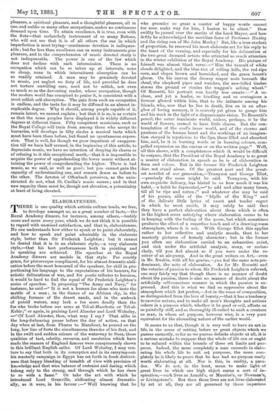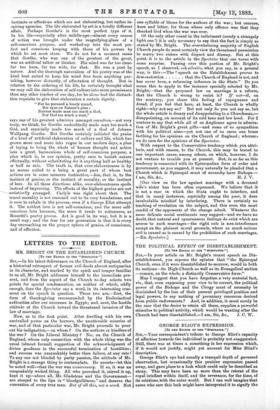ELABORATENESS.
THERE is one quality which artistic culture tends, we fear, to develope amongst us, as a great number of facts,—the Royal Academy dinners, for instance, among others,—testify more and more every year, which we do not think it is possible to regard with unmixed satisfaction, and that is, elaborateness. No one understands how either to speak or to paint elaborately, and how to speak and paint admirably in the elaborate style, better than Sir Frederick Leighton ; but it cannot be denied that it is in an elaborate style,—a very elaborate style,—that his best performances both in painting and in speaking are achieved. His speeches at the Royal Academy dinners are models in that style. For courtly grace, for picturesque compliment, for his almost dramatic abdi- cation before the most honoured of the speakers, for skill in pro- portioning his language to the expectations of his hearers, for artistic delineations of war, and for poetic tributes to heroism, it would be hard to find the equal of Sir Frederick Leighton's series of speeches. In proposing "The Army and Navy," for instance, he said—" It is not a human foe alone who tests the mettle of a man ; in the flames of an African sky, in the shifting furnace of the desert sands, and in the ambush of putrid waters, may lurk a foe more deadly than the foe who broke before our arms at Tel-al-Maschuta or Tel-el- Kebir ;" or again, in praising Lord Alcester and Lord Wolseley, —" Of Lord Alcester, then, what may I say P That alike in the long-forbearing pause- before the day of action, on that day when at last, from Pharos to Marabout, he poured on the long, low line of forts the simultaneous thunder of his fleet, and in the swift and sudden seizure of the waterway to Suez, those qualities of tact, celerity, resource, and resolution which have made the seamen of England famous were conspicuously shown in this brilliant English sailor. Of Lord Wolseley, I may ven- ture to say that both in its conception and in its carrying-ont, his masterly campaign in Egypt has set forth in fresh distinct- ness that happy blending of breadth of view with precision of knowledge and that wise balance of restraint and daring, which belong only to the strong, and through which he has risen to so wide a fame." Or take the art with which he introduced Lord Granville, abdicating almost dramatic- ally, as it were, in his favour :—" Well knowing that he who precedes so great a master of happy words cannot too soon make way for him, I hasten to be silent." How swiftly he passed over the merits of the Lord Mayor, and how deftly he acknowledged the meridian fame of Professor Huxley and the rising sun of Mr. John Morley ! But like a true student of proportion, he reserved his most elaborate art for his reply to the toast of the evening, and especially for his delineation of the two great deceased artists who attracted so much attention in the winter exhibition of the Royal Academy. His picture of Linnell was almost blank verse:—" Him the tumult of white clouds delighted, and the blue riot of rolling hills, the red-ripe corn, and slopes brown and burnished, and the green forest's gloom. On his canvas the drowsy reaper nods beneath the sheaf, the shepherd pipes and watches, the new-felled timber strews the ground or strains the waggon's aching wheel." Of Rossetti, his portrait was hardly less ornate :—" A re- cluse, and yet a leader, so kindling and so contagious a fervour glowed within him, that to the intimate among his friends, who, now that he lies in death, live on in an after- glow of loving memory, it is scarcely yet given to gauge him and his work in the light of a dispassionate vision. To Rossetti's pencil, the outer inanimate world, unless, perhaps, it be the world of flowers, seemed to have little charm. But the con- templation of the soul's inner world, and of the storms and passions of the human heart and the workings of an imagina- tion steeped in mysticism to the lips, these filled and absorbed him, and, be it in burning words or in burning colours, com- pelled expression on the canvas or on the written page." Well, all this shows, with a completeness which it would be difficult to surpass, that the President of the Royal Academy is as great a master of elaboration in speech as he is of elaboration in form and colour. But in the former Sir Frederick Leighton does not stand alone. Of the greatest poet and the great- est novelist of our generation,—Tennyson and George Eliot, —precisely the same might be said. Tennyson, with his own exquisite delicacy, has hinted to us how much it was his habit,—a habit he deprecated,—" to add and alter many times, till all be ripe and rotten ;" and whatever else may be said of his poems, alike of the "Idylls of the King" and of the delicate little lyrics of sweet and tender regret
in which he most excels, it may safely be said that they have a perfect elaboration about them which is often in the highest sense satisfying where elaboration seems to be in keeping with the feeling of the poem, but which sometimes produces the effect of a superfine touch and of a drawing-room atmosphere, where it is not. With George Eliot this applies rather to her reflective and analytic moods, than to her masterly pictures of homely character ; but in the former you often see elaboration carried to an exhaustive point, and sink under the artificial analysis, irony, or melan- choly, till you feel almost as if you were under the re- ceiver of an air-pump. And in the great writers on Art,—even in Mr. Ruskin, with all his genins,—you feel the same note pre- dominant, the note of elaboration. As for Mr. Rossetti and the votaries of passion to whom Sir Frederick Leighton referred, one may fairly say that though there is no manner of doubt about the passion, there is also no manner of doubt about the artificially self-conscious manner in which the passion is ex- pressed. And this is what we find so oppressive about the atmosphere which Art prefers,—Art in the sense of composition, as distinguished from the love of beauty,—that it has a tendency to exorcise nature, and to make all men's thoughts and actions cohere in a purpose which, whether it be good or evil, affects us as painfully stiff, and as thoroughly ill-suited to such a creature as man, in whom set purpose, however wise, is a very poor equivalent for the abounding nature of the earlier world.
It seems to us that, though it is very well to have an art in life, in the sense of setting before us great objects which we pursue earnestly, so far as we pursue definite objects at al, it is a serious mistake to suppose that the whole of life can or ought to be reduced within the bounds of these set limits and par- pores. Indeed, the more completely a man succeeds in elabo- rating his whole life to suit set purposes, the more com- pletely he is likely to prove that he has had no purpose really worth elaborating at all. Nor is this, in reality, a para- dox. We do not, in the least, mean to make light of great lives in which one high object seems a sort of in- spiration,—such lives as Arnold's, or Maurice's, or Newman's, or Livingstone's. But then these lives are not lives elaborated by art at all, they are all governed by those imperious
instincts or affections which are not elaborating, but rather in- spiring agencies. The life elaborated by art is a totally different affair. Perhaps Goethe's is the most perfect type of it. In his life—especially after middle-age—almost every course of action was brought under the magnifying-glass of a self-conscious purpose, and worked-up into the most per- fect and conscious keeping with those of his powers by which he set most store. We do not for a moment mean
that Goethe. who was one of the greatest of the great, was an artificial talker or thinker. His mind was far too clear, far too keen, far too wide, for that. He was a poet by nature. And the thorough naturalism of his poetry was of the
kind best suited to keep his mind free from anything par- taking, however distantly, of affectation of thought. But in relation to the ordering of his life, he certainly brought what we may call the elaboration of self-culture into more prominence than any other teacher of our day, for he alone had the distinct- tion requisite to give that elaboration a certain dignity.
"For be pursued a lonely round, His eyes on Nature's plan ;
Neither made man too much a God, Nor God too much a man,"
says one of his greatest admirers amongst ourselves,—not very truly, we think, for Goethe undoubtedly made man too much a God, and, especially made too much of a God of Johann Wolfgang Goethe. But Goethe certainly initiated the praise of a kind of artificial elaboration of culture and life, which has grown more and more into vogue in our modern days, a plan of trying to bring the whole of human thought and action into a great, harmonious whole of self-conscious purpose, a plan which is, in our opinion, pretty sure to banish nature effectually, without substituting for it anything half as healthy or half as safe. The truth is, that over-elaborateness is by no means suited to a being a great part of whose best actions are in some measure instinctive,—dne, that is, to the instinct of genius, or the instinct of morality, or the instinct of love. In all these directions alike, over-elaborateness spoils instead of improving. The efforts of the highest genius are not .-44iatioally arrange& Carlyle was right about that. The truest morality is not reasoned out to its very foundations, and is sure to exhale in the process, even if a George Eliot attempt it. The noblest love is not self-conscious, and the more self- conscious love becomes, the more it tends to rottenness, as Rossetti's poetry proves. Art is good in its way, but it is a small way ; and the fear for our generation is that it is every day encroaching on the proper sphere of genius, of conscience, and of affection.



































 Previous page
Previous page